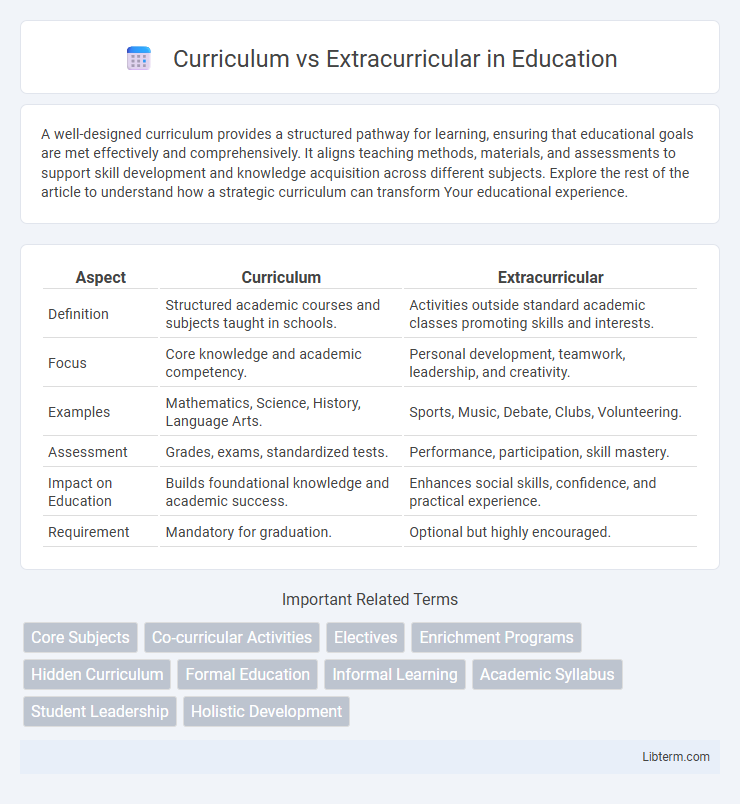A well-designed curriculum provides a structured pathway for learning, ensuring that educational goals are met effectively and comprehensively. It aligns teaching methods, materials, and assessments to support skill development and knowledge acquisition across different subjects. Explore the rest of the article to understand how a strategic curriculum can transform Your educational experience.
Table of Comparison
| Aspect | Curriculum | Extracurricular |
|---|---|---|
| Definition | Structured academic courses and subjects taught in schools. | Activities outside standard academic classes promoting skills and interests. |
| Focus | Core knowledge and academic competency. | Personal development, teamwork, leadership, and creativity. |
| Examples | Mathematics, Science, History, Language Arts. | Sports, Music, Debate, Clubs, Volunteering. |
| Assessment | Grades, exams, standardized tests. | Performance, participation, skill mastery. |
| Impact on Education | Builds foundational knowledge and academic success. | Enhances social skills, confidence, and practical experience. |
| Requirement | Mandatory for graduation. | Optional but highly encouraged. |
Defining Curriculum: Core Components in Education
Curriculum in education refers to the structured set of courses and content that defines the core academic knowledge and skills students must acquire, including subjects such as mathematics, science, language arts, and social studies. It encompasses learning objectives, instructional materials, assessments, and teaching methods designed to meet educational standards and promote cognitive development. The curriculum serves as the foundational framework guiding educational institutions in delivering consistent and measurable learning outcomes.
Understanding Extracurricular Activities
Extracurricular activities encompass sports, clubs, volunteer work, and arts beyond the formal school curriculum, fostering skills like teamwork, leadership, and creativity. Participation in these activities supports social development and enhances college applications by showcasing diverse interests and commitment. Schools increasingly recognize extracurriculars as essential for holistic student growth and practical experience outside traditional academics.
Key Differences Between Curriculum and Extracurricular
Curriculum refers to the structured, academic content and learning objectives mandated by educational institutions, focusing on core subjects like math, science, and language arts. Extracurricular activities encompass non-academic pursuits such as sports, music, clubs, and volunteer work that develop social skills, leadership, and personal interests. The key difference lies in curriculum shaping formal education and assessment, while extracurricular activities enhance holistic development beyond the classroom.
The Role of Curriculum in Academic Success
The curriculum serves as the foundational framework for academic success by providing structured knowledge, skills, and learning objectives aligned with educational standards. It ensures a coherent progression through subjects, fostering critical thinking, problem-solving, and subject mastery essential for standardized assessments and higher education readiness. Effective curriculum design directly influences student achievement outcomes by integrating rigorous content, assessment strategies, and pedagogical methodologies that support cognitive development.
The Impact of Extracurriculars on Personal Development
Extracurricular activities significantly enhance personal development by fostering essential skills such as teamwork, leadership, and time management beyond the academic curriculum. Participation in sports, clubs, or volunteer work encourages social interaction and emotional growth, contributing to improved self-confidence and resilience. Studies reveal that students engaged in extracurriculars often achieve higher academic performance and demonstrate better problem-solving abilities.
Balancing Academic and Non-Academic Pursuits
Balancing academic curriculum with extracurricular activities enhances student development by fostering both intellectual growth and social skills. Integrating structured coursework alongside sports, arts, and clubs promotes time management and holistic learning experiences. Prioritizing this balance supports mental well-being while preparing students for diverse real-world challenges.
Benefits of Integrating Extracurriculars with Curriculum
Integrating extracurricular activities with the curriculum enhances student engagement by providing practical applications of academic concepts, fostering critical thinking and creativity. This approach supports holistic development, improving social skills, teamwork, and leadership alongside intellectual growth. Schools that blend curricular lessons with extracurricular involvement often see higher academic performance and better emotional well-being among students.
Challenges in Managing Curriculum and Extracurricular Activities
Balancing curriculum and extracurricular activities presents challenges such as limited time, resource allocation, and ensuring student engagement without causing burnout. Schools must strategically plan schedules to prevent conflicts and provide equitable opportunities for diverse student interests. Effective management requires ongoing collaboration between educators, parents, and administrators to foster holistic development.
The Future of Comprehensive Education
Curriculum and extracurricular activities together shape the future of comprehensive education by fostering cognitive development and essential life skills beyond traditional academics. Integrating project-based learning within curricula alongside diverse extracurricular options enhances student engagement, creativity, and critical thinking. Educational institutions increasingly recognize that balanced emphasis on both areas prepares learners for adaptive careers and global challenges.
Choosing the Right Mix for Student Success
Balancing curriculum and extracurricular activities is essential for fostering well-rounded student success by enhancing both academic skills and personal development. A carefully chosen blend of rigorous coursework and meaningful extracurricular engagement improves cognitive abilities, social skills, and emotional resilience. Tailoring this mix to individual student interests and goals optimizes motivation, time management, and long-term achievement.
Curriculum Infographic

 libterm.com
libterm.com